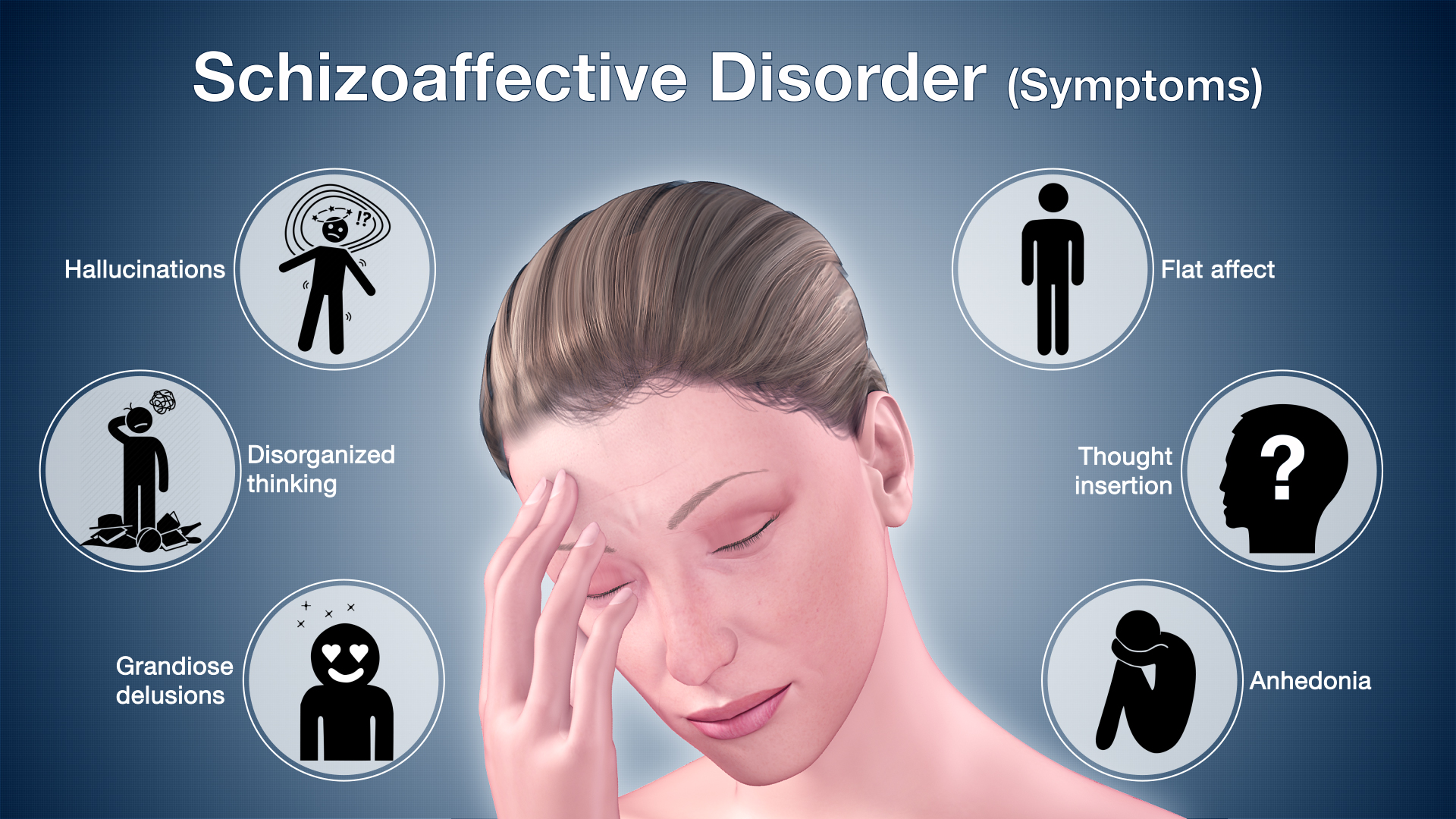What are the symptoms of schizoaffective disorder?
Schizoaffective disorder is characterized by a combination of symptoms from both schizophrenia and mood disorders. Individuals with this condition may experience symptoms of schizophrenia, such as hallucinations (often auditory, like hearing voices), delusions (firmly held false beliefs), disorganized thinking (leading to incoherent or illogical speech and behavior), and disorganized or catatonic behavior (erratic actions or lack of movement).
In addition to these symptoms, schizoaffective disorder also involves symptoms of a mood disorder. This can include depressive episodes marked by persistent sadness, hopelessness, changes in appetite, sleep disturbances, and decreased energy. Alternatively, manic episodes may occur, featuring elevated mood, excessive energy, grandiosity, rapid speech, decreased need for sleep, and impulsive behavior.
For a diagnosis of schizoaffective disorder, individuals must experience significant symptoms from both categories, with mood disorder symptoms being prominent during episodes. The disorder can manifest with depressive episodes, manic episodes, or both, depending on the person.
What are the causes of schizoaffective disorder?
The exact causes of schizoaffective disorder are not fully understood, but several factors are believed to contribute to its development:
- Genetic Factors: There is evidence suggesting that genetics play a role in the development of schizoaffective disorder. Individuals with a family history of schizophrenia or mood disorders may be at higher risk.
- Neurobiological Factors: Imbalances in brain chemicals (neurotransmitters) such as dopamine and serotonin, and abnormalities in brain structure or function, are thought to be involved in the disorder. These neurobiological issues may affect mood regulation and cognitive processes.
- Environmental Factors: Stressful life events, trauma, or significant life changes may trigger or exacerbate the symptoms of schizoaffective disorder. Exposure to early-life stress or adverse experiences can also contribute.
- Developmental Factors: Complications during pregnancy or birth, such as prenatal exposure to infections, malnutrition, or birth trauma, may influence the risk of developing schizoaffective disorder later in life.
- Biological Factors: Certain medical conditions or substance abuse issues may contribute to the development of schizoaffective disorder. Substance use, for instance, can exacerbate or mimic symptoms of the disorder.
- Psychological Factors: Psychological stressors or cognitive distortions may play a role in the onset or progression of the disorder. However, these are usually considered secondary to the primary biological and genetic factors.
Overall, schizoaffective disorder likely results from a complex interplay of genetic, biological, environmental, and psychological factors.
What is the treatment for schizoaffective disorder?
Treatment for schizoaffective disorder involves a combination of medication, psychotherapy, and supportive services. Medication is often used to manage symptoms, with antipsychotics helping with hallucinations and delusions, mood stabilizers addressing manic or depressive episodes, and antidepressants being beneficial for depressive symptoms. In some cases, anxiolytics may also be prescribed to reduce anxiety.
Psychotherapy, particularly Cognitive Behavioral Therapy (CBT), is effective in helping individuals identify and change negative thought patterns and behaviors, while psychosocial interventions and family therapy provide additional support in improving social functioning and communication within the family.
Supportive services, such as case management, peer support groups, and educational programs, are essential for comprehensive care, helping individuals and their families manage symptoms effectively. Lifestyle modifications, including stress management techniques and maintaining healthy living habits, contribute to overall well-being and help reduce stress, which can exacerbate symptoms.
Working closely with healthcare providers to tailor a treatment plan to individual needs is crucial, as early intervention and adherence to treatment can significantly improve outcomes. Regular monitoring and adjustments may also be necessary to ensure the effectiveness of the treatment and to manage any potential side effects of medications.

Leave a Reply
You must be logged in to post a comment.